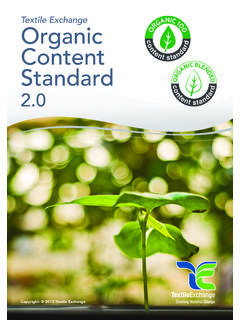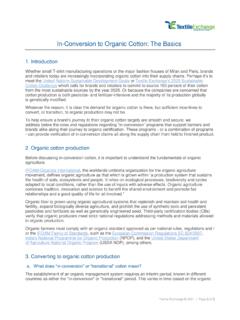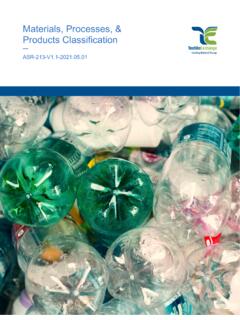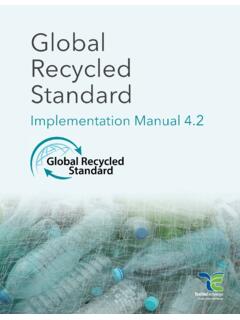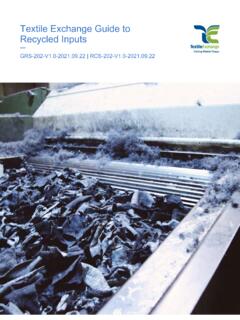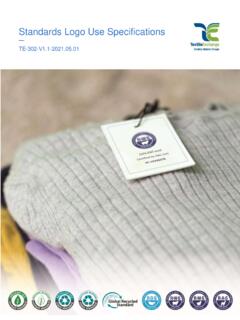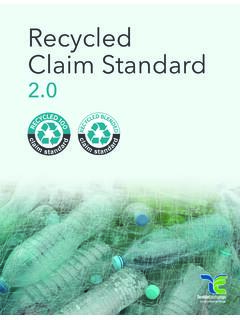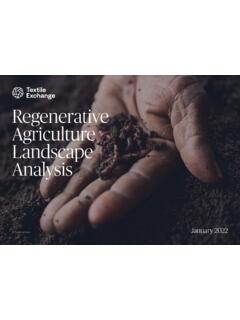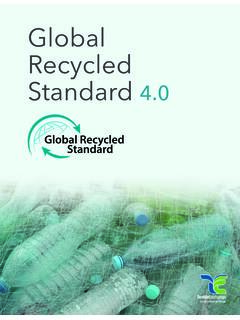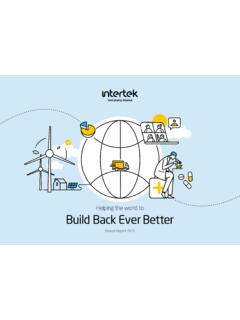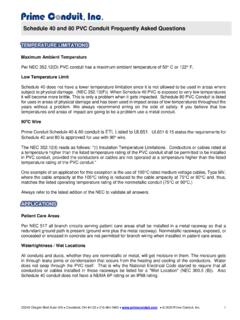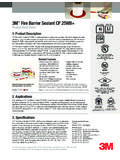Transcription of Global Recycled Standard - Textile Exchange
1 Global Recycled Standard Implementation Manual Global Recycled Standard GRS Implementation Manual 2014 Textile Exchange Textile Exchange Global Recycled Standard Implementation Manual Original Release Date: July 1, 2017. 2014 Textile Exchange . All rights reserved. GRS, Global Recycled Standard , and the GRS Logo are trademarks of Textile Exchange . The GRS Implementation Manual replaces GRS Implementation Manual and is effective as of November 21, 2019. English is the official language of the Global Recycled Standard . In any case of inconsistency between versions, reference shall be made to the English version. Disclaimer Although reasonable care was taken in the preparation of this document, Textile Exchange and any other party involved in the creation of the document HEREBY.
2 STATE that the document is provided without warranty, either expressed or implied, of accuracy or fitness for purpose, AND HEREBY DISCLAIM any liability, direct or indirect, for damages or loss relating to the use of this document. Copyright This publication is protected by copyright. Information or material from this publication may be reproduced in unaltered form for personal, non-commercial use. All other rights are reserved. Information or material from this publication may be used for the purposes of private study, research, criticism or review permitted under the Copyright Act 1976. Any reproduction permitted in accordance with the Copyright Act 1976 shall acknowledge the Global Recycled Standard as the source of any selected passage, extract, diagram or other information.
3 1. GRS Implementation Manual 2014 Textile Exchange Table of Contents Foreword .. 5. Introduction .. 5. International Working Group Members .. 7. How to use this Document .. 8. Guidance 8. Section A General Information .. 10. A1 Definitions .. 10. A2 16. Accompanying Documents .. 16. Referenced Documents .. 17. A3 Principles of GRS Certification .. 18. Scope .. 18. Scope .. 20. A4 Recycled Material Requirements .. 20. Material 23. A5 Supply Chain Requirements .. 26. Application of Production 26. Production and Trade .. 26. Section B Social Requirements .. 29. B1 Social 30. Certified Organizations shall have a clear set of policies to ensure compliance with the social requirements of the GRS.
4 30. Record Keeping .. 30. B2 Social 31. Forced, bonded, indentured and prison labor .. 31. Child Labor .. 31. Freedom of association and effective recognition of the right to collective bargaining .. 32. 2. GRS Implementation Manual 2014 Textile Exchange Discrimination, harassment and abuse .. 33. Health and 34. Wages, benefits and terms of employment .. 35. Working Hours .. 37. Section C Environmental Requirements .. 38. C1 Environmental Management 38. Environmental Management 38. Chemical Management System .. 40. Record Keeping .. 41. C2 Environmental Requirements .. 41. Energy use .. 41. Water use .. 42. Wastewater / Effluent .. 42.
5 Emissions to Air .. 43. Waste management .. 44. Section D Chemical 45. D1 GRS Chemical 45. GRS Product Chemical 45. Record Keeping .. 46. D2 Restricted Chemical Substances in 47. Inherently problematic substances .. 47. Exclusion of substances and mixtures classified with particular hazard codes or risk phrases .. 47. Exclusion of substances that do not comply with the Manufacturer's Restricted Substance List (MRSL) from 50. Appendices .. 52. Appendix A Tools and Resources .. 52. Textile Exchange Certification Toolkit - Essential Series .. 52. Questions and Additional Information .. 52. Appendix B Reclaimed Material Supplier Agreement.
6 53. 3. GRS Implementation Manual 2014 Textile Exchange Appendix C Reclaimed Material Declaration Form:.. 54. *Definitions .. 55. Appendix D Wastewater Parameter Limit Values .. 57. 4. GRS Implementation Manual 2014 Textile Exchange Foreword The Global Recycle Standard (GRS) was originally developed by Control Union Certifications (CU) in 2008 and ownership was passed to Textile Exchange January 1, 2011. The previous version of the Standard , GRS , was released in 2014. Textile Exchange also owns and administrates the Content Claim Standard (CCS), the Recycled Claim Standard (RCS), the Organic Content Standard (OCS), the Responsible Down Standard (RDS), and the Responsible Wool Standard (RWS).
7 These standards are designed to ensure chain of custody for preferred materials, and to provide labeling tools for final product claims. Textile Exchange 's mission is to accelerate sustainable practices in the Textile industry. This acceleration only happens when steps have been taken to ensure that actions taken toward sustainability result in real and meaningful change. This requires a strong understanding of the issues and a plan to substantiate the claims being made. Certification to a third-party Standard accomplishes this. Introduction The Global Recycled Standard (GRS) is an international, voluntary, full product Standard that sets requirements for third-party certification of Recycled Content, chain of custody, social and environmental practices, and chemical restrictions.
8 The goal of the GRS is to increase use of Recycled materials in products and reduce/eliminate the harm caused by its production. The objectives of the GRS are: Alignment of definitions across multiple applications. Track and trace Recycled input materials. 5. GRS Implementation Manual 2014 Textile Exchange Provide customers (both brands and consumers) with a tool to make informed decisions. Reduce harmful impact of production to people and the environment. Provide assurance that materials in the final product are actually Recycled and processed more sustainably. Drive innovation in addressing quality issues in the use of Recycled materials.
9 The Global Recycled Standard is intended for use with any product that contains at least 20% Recycled Material. Each stage of production is required to be certified, beginning at the recycling stage and ending at the last seller in the final business-to-business transaction. Material Collection and Material Concentration sites are subject to self-declaration, document collection, and on-site visits. The GRS does not address quality or legal compliance. The GRS uses the ISO 14021 definition of Recycled Content, with interpretations based on the US Federal Trade Commission Green Guides; the intention is to comply with the most widely recognized and stringent definitions.
10 This is a voluntary Standard that is not intended to replace the legal or regulatory requirements of any country. It is the responsibility of each operation to demonstrate compliance with all applicable laws and regulations related to marketing, labor, and business practices. Sellers of GRS products are advised to reference the allowed Recycled Content claims in the countries of sale, to ensure that they are meeting all legal product claim requirements. The next scheduled revision of the GRS is in 2021. You may submit feedback to the Standard at any time; send to Points of clarification may be incorporated into the GRS Implementation Manual prior to 2021.

